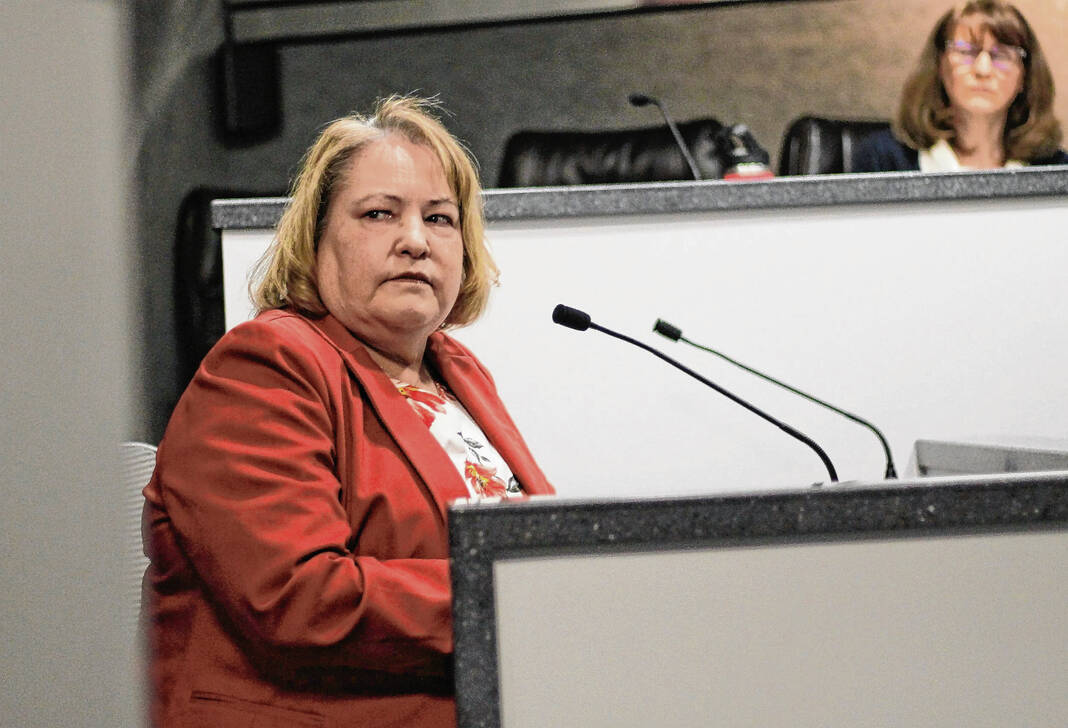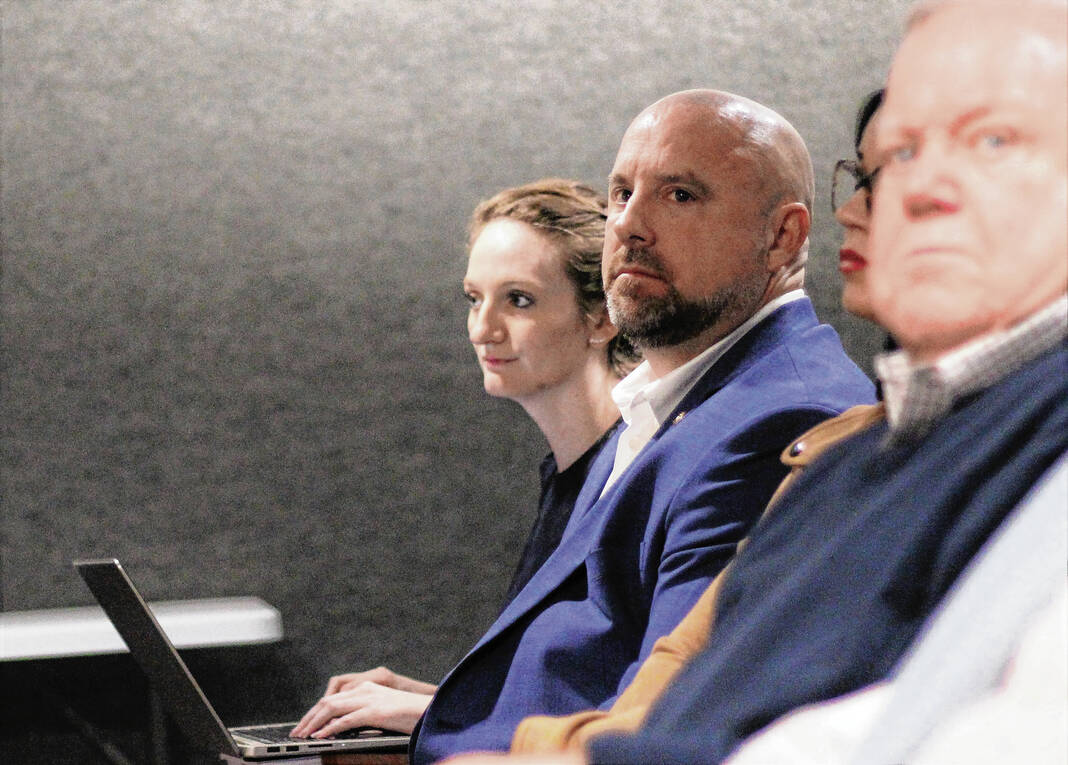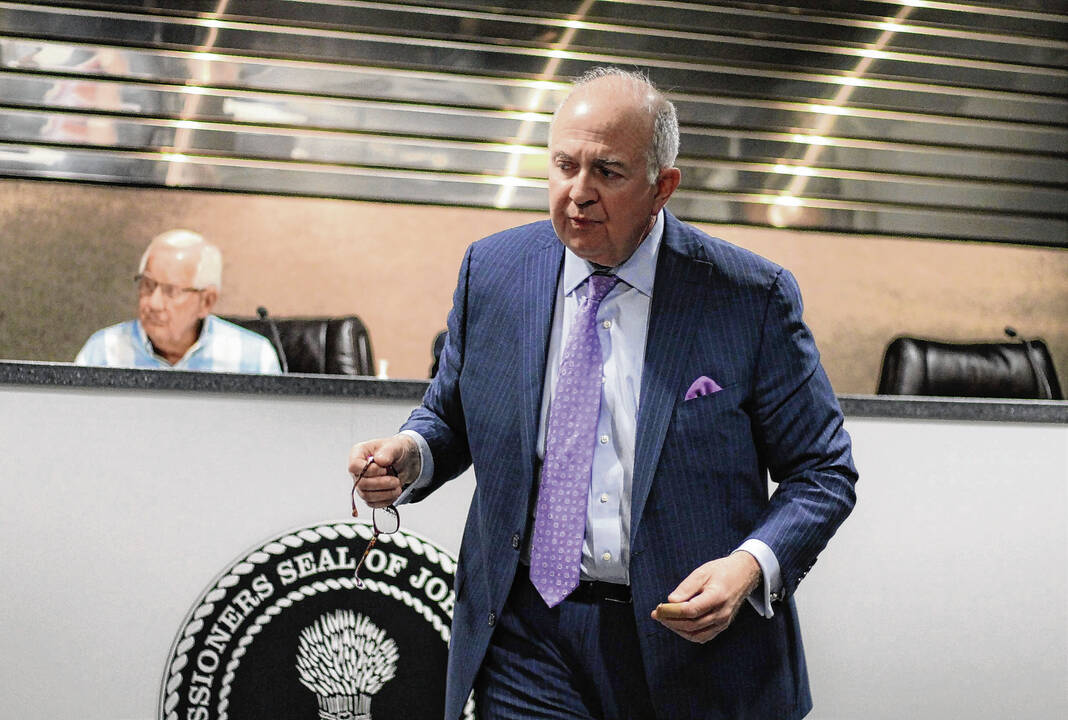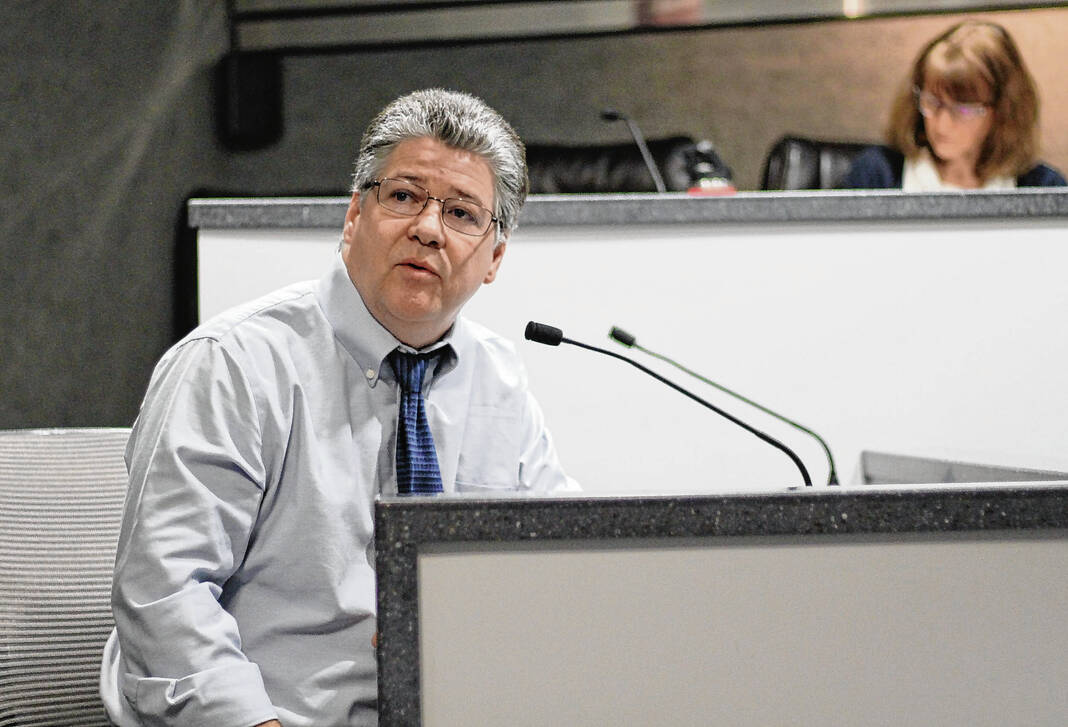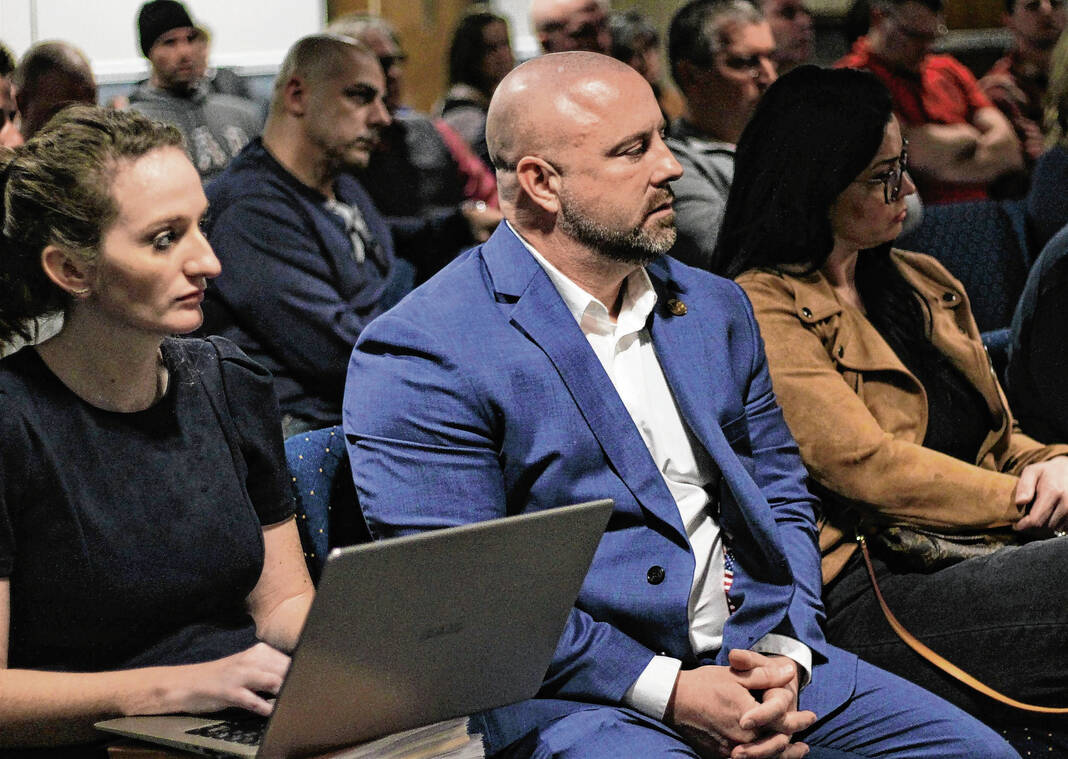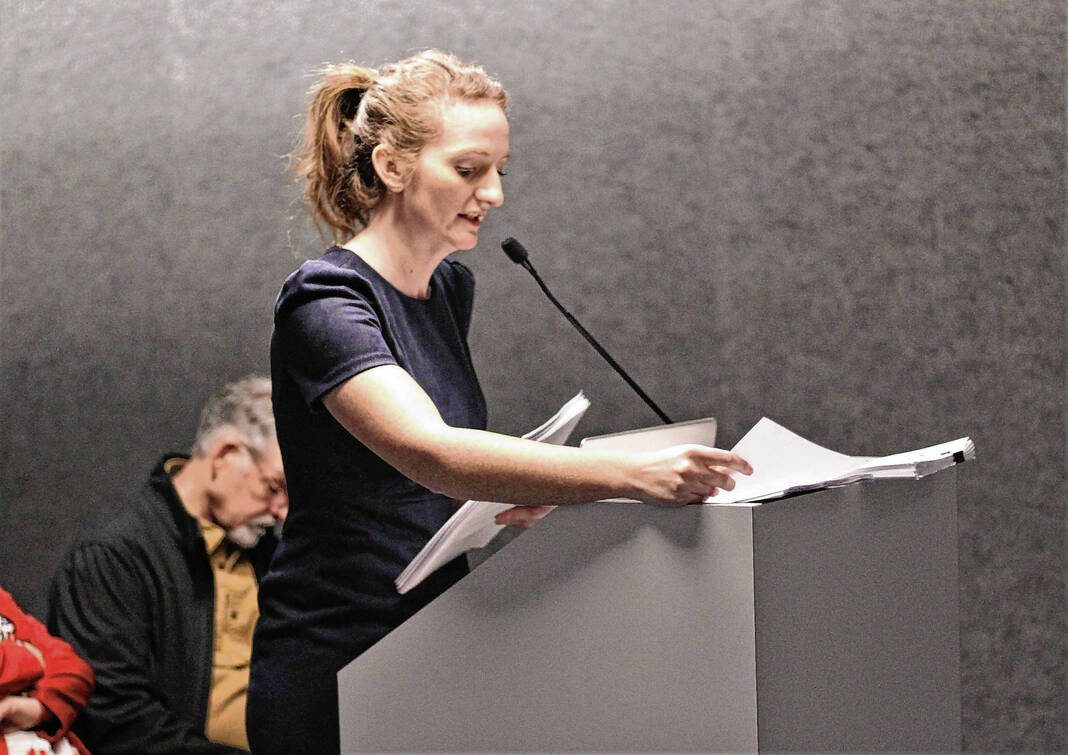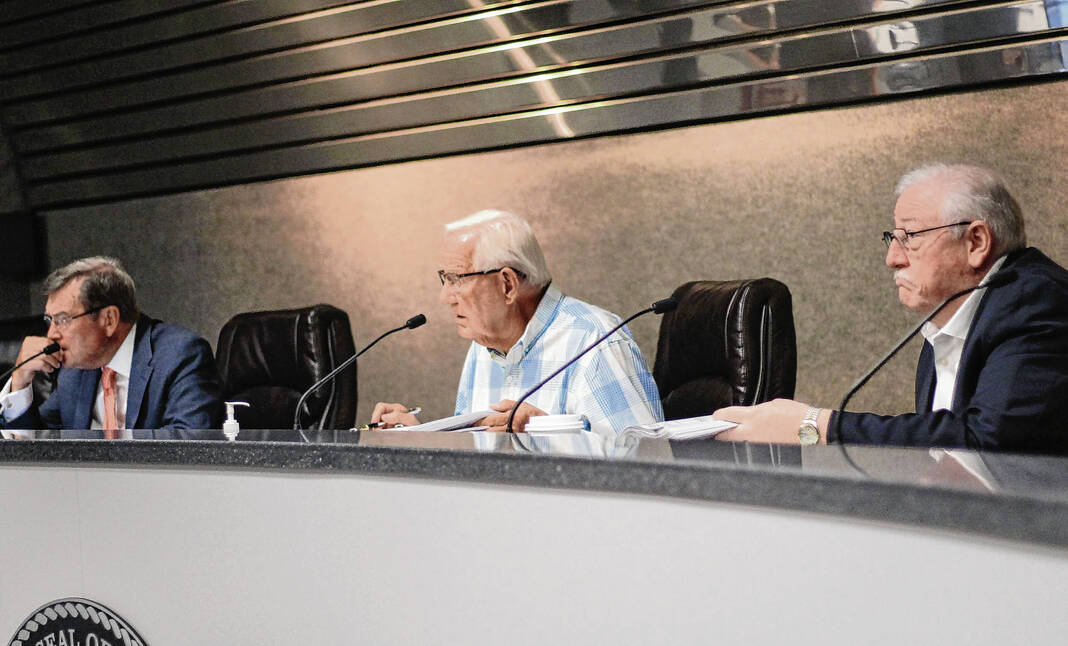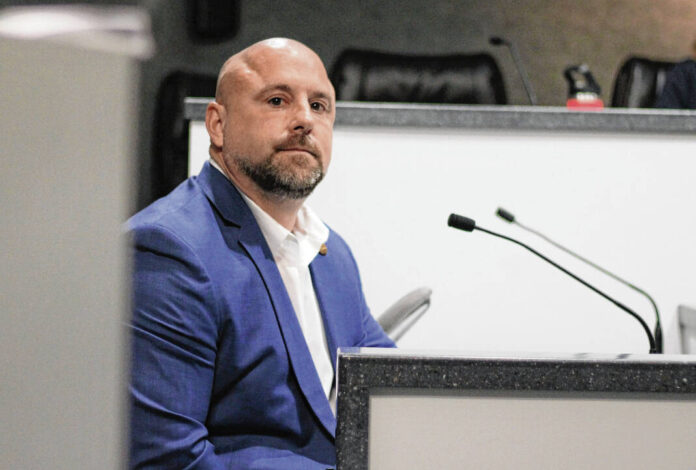
Greenwood mayoral candidate Joe Hubbard sits at the witness stand to be questioned by his attorney during a hearing before the Johnson County Election Board on a challenge to his Greenwood residency.
Emily Ketterer | Daily Journal
Greenwood mayoral candidate Joe Hubbard prevailed over three challenges against his residency in city limits. He will remain on the Republican ballot in May.
The Johnson County Election Board ruled Wednesday that the three Greenwood residents who filed challenges against Hubbard didn’t have enough evidence to prove he didn’t meet statutory residency requirements to be a candidate.
This decision came after three hours of testimony, questioning and discussion on election laws before the three-member Johnson County Election Board on Wednesday. The board unanimously declined to uphold three candidacy challenges filed against Hubbard. Their decision was met with cheers from several audience members who attended the hearing to support Hubbard.
Hubbard is challenging current Mayor Mark Myers, who has been in office since 2012.
Three residency challenges were filed on Feb. 10 by Lucy Bartley, Christopher Burton and Ronald Palmer. Near the start of the testimony, the board consolidated all three challenges into a single challenge.
Following the ruling, Hubbard said in a statement he was glad the board rejected the attempt to remove him from the ballot. He also criticized Myers’ actions as mayor, alleging crime has skyrocketed and saying taxes have increased and the city’s budget has almost doubled.
“I am glad the election commission rejected Mayor Mark Myers’s attempt to weaponize government to remove me from the ballot,” Hubbard said. “… We look forward to continuing our campaign by discussing issues that matter to Greenwood — making Greenwood safe, bringing back common-sense leadership, and fighting for Greenwood residents, not special interests and large corporate developers.”
The statement also criticized a Myers campaign fundraiser that promised private dinners with him in exchange for a donation of $5,000 or more.
Myers has not publicly commented on the challenges, and though there is speculation, there is no confirmed link between him and efforts to remove Hubbard from the ballot.
During the hearing, Hubbard explained in detail how he met residency requirements. This included details not previously publicly known. Hubbard declined to take part in an interview with the Daily Journal about the challenges when they were first filed earlier this month.
The challenges
The challengers were represented by local attorney Bill Barrett, of Williams Barrett & Wilkowski, LLP. His firm has contracts with many municipalities across the county, including the city of Greenwood, though he was not acting in that capacity Wednesday.
Bartley testified that Hubbard’s Greenwood Sanitation statements, along with a meter usage report, showed little to no sewer usage at the home from Sept. 9 to Jan. 10.
She had also asked for copies of Bargersville utility bills for Hubbard’s home on Bloomsbury Court, which is located in unincorporated White River Township, but wasn’t able to get them. However, a utility employee did tell her the usage at the home hadn’t decreased, but actually went up, she said.
Greenwood Parks Board member Christopher Burton filed his challenge after speaking with another board member, he testified. The mentioned member lives in the ClearBrook Village subdivision — the same neighborhood as Hubbard’s Stonemill Drive home — and said they hadn’t seen Hubbard in the neighborhood.
Burton also said under oath that he did not communicate with Myers or any of the other challengers about his challenge. Litany Pyle, Hubbard’s attorney, later asked Burton who was responsible for appointing him to the parks board. He said the mayor was.
Ronald Palmer, a candidate for Greenwood City Council, filed a challenge based on Facebook posts questioning Hubbard’s residency. Like the other challengers, did not have first-hand knowledge of whether lived there as he had never been inside the home, he said.
Chuck Harlow, an unincorporated Clark Township resident who is Hubbard’s brother-in-law, also testified Hubbard didn’t live at the home. Harlow did not file a challenge against Hubbard, however, he did file a request with the election board to be heard on the matter. Harlow said he decided to speak out because he had “a very strong feeling” Hubbard didn’t live at the home. Photos on Hubbard’s Facebook page from late last year had been taken at the Center Grove home, which implied he still lived there, he testified.
Hubbard later testified that he and Harlow had a distant, but cordial relationship and denied the allegations.
The sewer bills
Hubbard refuted the claims about his sewer bills and brought evidence showing proof of residency.
Along with Hubbard’s driver’s license and voter registration being updated before the November deadline, Hubbard testified he bought all new furniture for the Stonemill Drive home. He provided receipts, many dated from summer 2022, as part of his testimony.
After Hubbard first bought the home in June, he said he spent months renovating it with a friend. He moved into the home in October, he testified.
In response to the claims about the sewer usage, Hubbard said he discovered a water leak in early November and hired a contractor to fix it. While the contractor was making repairs, Hubbard said he did not shower as frequently at the home, instead showering at other places like the gym.
During that construction work, he also found mold in the home, which led to him not being there as much in the fall, he said.
Additionally, the low usage rate could show as zero if a person uses less than around 750 gallons of water, Hubbard said citing information from the city’s utility. Using billing statements he provided to the board from Indiana American Water, Hubbard said he used around 700 to 800 gallons of water in October.
Living alone
Hubbard also revealed he’s been staying at the home by himself, with the exception of his daughters sometimes staying. He and his wife separated last summer, so it’s mainly been him at the home, he said.
His wife is also continuing to occupy the Bloomsbury home, which is why there continues to be usage there.
Amy Harte Wampler, Hubbard’s ex-wife and mother of his two daughters, confirmed that their daughters have been staying at the home. Hubbard had been back and forth during the remodeling process and because of the mold, which was remedied by the end of December, she said.
Hubbard also addressed the “Adults-only” sign in the community. From his reading of the homeowner’s association rules, there were no bylaws, declarations, or covenants that restricted the age of occupants or did not allow families to live there.
“All it says is they have to be owner-occupied,” he said.
Owning two homes
Hubbard was also questioned by Barrett about his mortgage and home equity documents for both homes. Per a home equity loan given last year, the loan read he was required to stay at the Bloomsbury Court home, unless he received permission from a lender to not occupy it as his principal residence.
He testified he did not know of any residency stipulations for that agreement, he said.
Additionally, he was asked about the mortgage agreement for the Stonemill Drive home. Hubbard said he didn’t remember reading the agreement before he signed it.
“I don’t even know what this is,” Hubbard said. “I’m gonna be honest with you, I’m assuming it’s one of the 50 pages I signed for closing on a home.”
A deed for the home also showed that Hubbard requested tax statements be sent to his Bloomsbury address. But Hubbard didn’t remember agreeing to this, and later testified under questioning from his attorney that it wasn’t his writing on the deed.
“I didn’t write that, that was prepared by the title company that repairs a lot of my homes that I sell online,” he said.
Hubbard also said he did not give any direction for the tax statements to be sent to his Bloomsbury home. He did not expect to be moving into the Stonemill home right away due to the renovations, so he wouldn’t have expected documents to be sent there until after he moved.
Homestead deduction
Hubbard also requested his homestead deduction be transferred from his Bloomsbury home to his Stonemill home in December. The reason for the transfer was that he was selling his Bloomsbury home, which was listed as for sale by owner on Zillow on Feb. 8.
On top of everything else he was doing, the homestead deduction transfer was on the back-burner, he said.
“I didn’t anticipate the marriage issues,” Hubbard said. “A lot of things got put on the back-burner or slipped my mind.”
The price point of the Bloomsbury home was also a point of contention. Barrett says the home, which is listed at $849,000, is priced about $200,000 above what other homes in the area are priced, a move Barrett implied was deliberate.
“He’s not trying to sell it. He’s trying to make you think he sold it,” Barrett said.
Pyle later said Hubbard had no plans to return to his Bloomsbury home. Under her questioning, Hubbard said as of October his intent and actions were to permanently live at the Stonemill home. He also said he planned on downsizing anyway, even before he committed to running for mayor.
Confusion amid deliberations
As the election board deliberated, members appeared to be confused over what date Hubbard was supposed to meet the requirements by.
State law requires mayoral candidates for a city of Greenwood’s size to live within city limits for at least one year before the municipal election. Municipal Election Day is Nov. 7, meaning candidates must have lived within city limits since at least before Nov. 7, 2022.
That statute does not include the municipal primary, which is where the confusion was.
Republican election board member Phil Barrow initially made a motion to uphold the challenge, saying Hubbard did not meet the requirements by the May 2 primary, and Democratic member Kevin Service seconded it.
However, Pyle — with the agreement of Barrett —asked them to clarify which date they were referring to when saying Hubbard did not live in Greenwood a year before Election Day. Board attorney Stephen Huddleston later confirmed they were supposed to be looking at the Nov. 7 date.
Once this was confirmed, Service withdrew his second and the motion failed. After further discussion about what Election Day the state law refers to, Service then made a motion to deny the challenge. The board then voted unanimously to keep Hubbard on the ballot.



